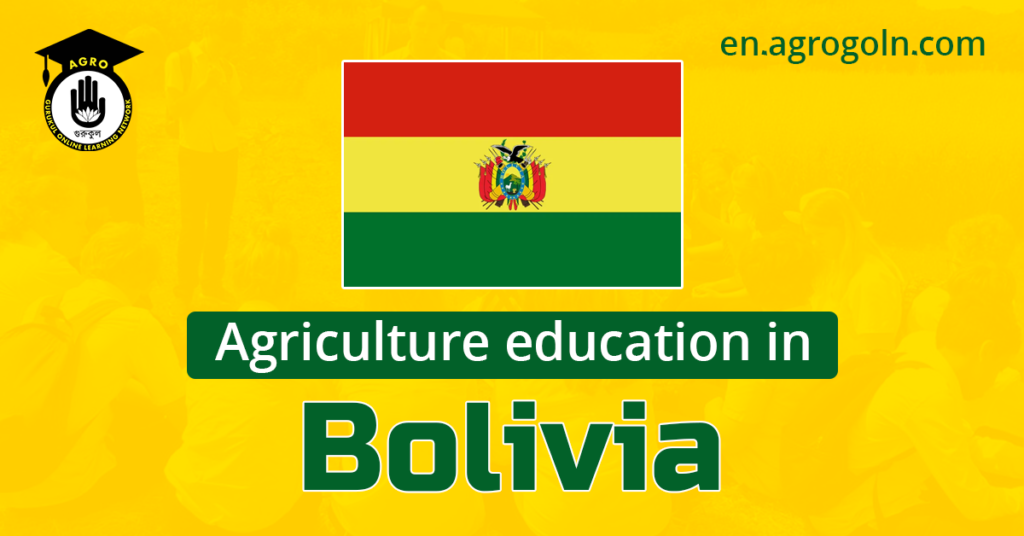Agricultural Education in Bolivia: Empowering Farmers and Sustaining Agriculture. Agriculture is the backbone of Bolivia’s economy, employing a significant portion of its population and contributing to its food security and export revenues. Given its importance, agricultural education plays a crucial role in empowering farmers, enhancing agricultural practices, and ensuring sustainable development. This article explores the state of agricultural education in Bolivia, its challenges, achievements, and the efforts being made to support the nation’s agricultural sector.
Agricultural Education in Bolivia: Empowering Farmers and Sustaining Agriculture
The Significance of Agriculture in Bolivia
Bolivia, a landlocked country in South America, possesses diverse agro-climatic regions, ranging from the high-altitude Andean plateaus to the tropical lowlands of the Amazon Basin. This geographic diversity has allowed Bolivia to cultivate various crops, including quinoa, soybeans, coffee, cocoa, and bananas. Additionally, Bolivia is a major producer of natural resources such as minerals and gas. Agriculture, alongside mining and manufacturing, forms a critical pillar of the nation’s economy.
Agriculture is vital for employment and rural development in Bolivia, providing livelihoods for approximately 30% of the workforce. It also contributes to the country’s export revenues, with agricultural products accounting for a substantial portion of its exports. Therefore, ensuring the sustainability and productivity of agriculture is a national priority.
Challenges in Bolivian Agriculture
Despite its potential, Bolivian agriculture faces numerous challenges that hinder its growth and development. Some of these challenges include:
1. Limited Access to Education: A significant portion of the rural population in Bolivia lacks access to quality education, including agricultural education. This hampers farmers’ ability to adopt modern agricultural practices and technologies, leading to lower productivity and competitiveness.
2. Fragmented Land Ownership: The distribution of land in Bolivia is highly skewed, with large estates coexisting with small, subsistence farms. The fragmentation of land ownership makes it challenging to implement large-scale agricultural projects and hinders efforts to achieve economies of scale.
3. Climate Change and Environmental Issues: Bolivia is vulnerable to the impacts of climate change, such as irregular rainfall patterns, droughts, and landslides. Environmental degradation, deforestation, and soil erosion also pose significant threats to agricultural productivity.
4. Limited Market Access: Many small-scale farmers struggle to access markets due to inadequate transportation infrastructure and limited market linkages. This results in limited opportunities to sell their produce at fair prices and hampers overall agricultural growth.
The Role of Agricultural Education
Agricultural education in Bolivia plays a pivotal role in addressing these challenges and enhancing the sustainability and productivity of the agricultural sector. By equipping farmers with knowledge and skills, agricultural education empowers them to adopt improved agricultural practices, adapt to climate change, and adopt sustainable land management techniques.
1. Capacity Building and Training: Agricultural education institutions provide training and capacity-building programs to farmers and rural communities. These programs cover various topics, including crop management, livestock rearing, soil conservation, water management, and climate-smart agriculture.
2. Technology Transfer: Agricultural education facilitates the transfer of modern agricultural technologies to farmers. This includes the use of improved seeds, irrigation systems, agricultural machinery, and pest management practices.
3. Research and Innovation: Agricultural universities and research institutions conduct research on crop varieties, farming techniques, and sustainable practices. The findings from this research contribute to evidence-based agricultural policies and practices.
4. Encouraging Entrepreneurship: Agricultural education fosters entrepreneurial skills among farmers, encouraging them to explore value-added activities, such as agro-processing and niche market opportunities.
Government Initiatives and Partnerships
Recognizing the significance of agricultural education, the Bolivian government has taken several steps to support and strengthen the sector. It has increased investments in agricultural research and extension services to ensure that the latest knowledge and technologies reach farmers in remote areas.
The government has also established agricultural training centers and schools, providing practical training and education to farmers. These institutions offer courses on organic farming, sustainable practices, and market-oriented agriculture.
Moreover, partnerships between the government, agricultural institutions, and international organizations have been instrumental in promoting agricultural education in Bolivia. Collaboration with organizations such as the United Nations Food and Agriculture Organization (FAO) and the International Fund for Agricultural Development (IFAD) has enabled access to resources, technical expertise, and financial support.
Challenges and Opportunities for the Future
While progress has been made in strengthening agricultural education in Bolivia, several challenges persist. These include the need to expand access to education in rural areas, invest in research and development, and address the impacts of climate change and environmental degradation on agriculture.
Furthermore, promoting gender equality in agricultural education is crucial. Empowering women farmers through education and training can enhance their participation in decision-making and improve the overall efficiency and sustainability of agriculture.
Opportunities also exist for leveraging technology to enhance agricultural education. E-learning platforms, mobile applications, and virtual training can extend educational resources to remote areas and engage farmers more effectively.
Moreover, collaboration between the government, private sector, and civil society can lead to more comprehensive and holistic agricultural development strategies. Public-private partnerships can facilitate the transfer of technology, access to markets, and investment in agricultural infrastructure.
Conclusion
Agricultural education in Bolivia is instrumental in driving agricultural development, empowering farmers, and promoting sustainable practices. By equipping farmers with knowledge, skills, and access to modern technologies, agricultural education can elevate the productivity and resilience of Bolivia’s agricultural sector.
Efforts by the government, agricultural institutions, and international organizations demonstrate a commitment to strengthening agricultural education in the country. With continued investment, collaboration, and innovation, Bolivia can harness the potential of its agricultural sector to foster economic growth, rural development, and food security for its population.
See more:

